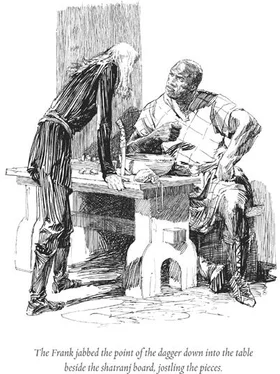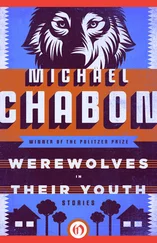Michael Chabon - Gentlemen of the Road
Здесь есть возможность читать онлайн «Michael Chabon - Gentlemen of the Road» весь текст электронной книги совершенно бесплатно (целиком полную версию без сокращений). В некоторых случаях можно слушать аудио, скачать через торрент в формате fb2 и присутствует краткое содержание. Жанр: Исторические приключения, на английском языке. Описание произведения, (предисловие) а так же отзывы посетителей доступны на портале библиотеки ЛибКат.
- Название:Gentlemen of the Road
- Автор:
- Жанр:
- Год:неизвестен
- ISBN:нет данных
- Рейтинг книги:3 / 5. Голосов: 1
-
Избранное:Добавить в избранное
- Отзывы:
-
Ваша оценка:
- 60
- 1
- 2
- 3
- 4
- 5
Gentlemen of the Road: краткое содержание, описание и аннотация
Предлагаем к чтению аннотацию, описание, краткое содержание или предисловие (зависит от того, что написал сам автор книги «Gentlemen of the Road»). Если вы не нашли необходимую информацию о книге — напишите в комментариях, мы постараемся отыскать её.
Gentlemen of the Road — читать онлайн бесплатно полную книгу (весь текст) целиком
Ниже представлен текст книги, разбитый по страницам. Система сохранения места последней прочитанной страницы, позволяет с удобством читать онлайн бесплатно книгу «Gentlemen of the Road», без необходимости каждый раз заново искать на чём Вы остановились. Поставьте закладку, и сможете в любой момент перейти на страницу, на которой закончили чтение.
Интервал:
Закладка:
“What is your Alp to us but a galley slave?” he said.
“If he was half the man you are, boy, he would have harangued and speechified those Northmen to death weeks ago,” another said.
There was laughter at this, and the soldiers felt their spirits a little restored, and little by little the square of the burned city, with its roofless mosque and its clouds of flies and its smell of death, began to resound with cries of “Filaq! Filaq!” that died away only when their object, having turned a shade of red deeper than the flush of sunset over the western gate of the town, ran down the steps of the mosque and fled into a side street.
CHAPTER EIGHT
They rode north through cities of carrion and widows, husk-and-stump cities where the Northmen's fires still burned. Everywhere they went-at first-male survivors of the raids fell in with the Brotherhood of the Elephant, as Filaq had dubbed them, in token of his own nickname and in bitter tribute to his dead father's fallen banner and to the creatures in whose passing lay the seeds of that fall. Some men came on horseback, bearing proper weapons, but most showed up on foot, shoeless, hungry, armed with a pruning hook or a fishing spear or the time-dulled sword of a grandfather's grandfather. Within a week of setting out for Atil, their ranks were swelled-like a gangrenous leg, as Zelikman remarked-by two or three thousand beardless fools, dodderers and men crippled by anger, aimless in their aim for revenge. Creaking leather and the snorting of mules, snatches of off-key ballads, the clop of hooves and the patter of bare soles, the rattle of hayforks and lances. In the teeming camps the nailheads of the night itself were loosened, it seemed to Amram, by snoring. They ate what they found, charred wheat in the ashes of granaries, dregs and roots and small birds. Five times a day a terrible wind blew through them and bent them like grasses to the ground.
As they moved north, synagogues began to outnumber mosques, and the towns showed no sign of ill treatment by the Rus, who had stopped only long enough to sell, peaceably, the amber, furs, timber and honey they brought with them from the north. This evident discrimination against the Muslims of the southern littoral outraged the Brotherhood, for it was seen as proof of the diabolical arrangement that the usurper, Buljan, had struck with the Northmen. And indeed, Filaq, Jew though he was, found little sympathy for his cause as they drew nearer to the capital, in the heart of Jewish Khazaria, where regard was high for the conduct and merchandise if not the uncouth manners of the Rus. Though there were expressions of regret over the reports of devastation wrought by the Northmen in the south, there was no direct experience of rapine to outweigh the testimony of rich pelts and sweet honey and the finest Baltic amber, and anyway, it was said, everyone knew that southern Khazars were inveterate malcontents and, furthermore, addicted to exaggeration.
“In Baghdad during the Days of Awe this year, the Muhammadans burned Jewish prayer houses and put to the sword any who would not profess Islam,” they were informed by the babaghuq, or mayor, of Sam-bunin, a Jewish Khazar town only four days’ ride from Atil. The babaghuq had ridden out with several city dignitaries wearing fine mustaches, backed by a well-armed if small party of soldiers, to demand the immediate surrender of the mutineers and to offer them, in the event they were unprepared to oblige, a generous emolument of five wagonloads of gold in the hope that the clink of dirhams might encourage the Brotherhood of the Elephant to leave Sambunin unmolested. In closing, the babaghuq quoted a remark widely attributed in the north to Buljan, who claimed in turn to have only been transmitting the wisdom of the kagan, Zachariah, sequestered in his forbidden palace on his sacred island:
“If the great Caliph in Baghdad sees fit to permit his Jews to be burned, it would be improper for the kagan of the Khazars not to ensure that his Muslims receive the same treatment.”
That night in their camp on a point of land north of the ransomed city, the Brotherhood of the Elephant spitted five hundred sheep and feasted on fresh apples with honey and pistachio nuts, a parting gift of the city fathers. Zelikman had eaten little and smoked long and now he sat staring into a campfire, stealing frequent glances toward Filaq. The Frank's unshaved cheeks sported patchy new wisps, and his golden hair hung filthy and lank.
“This is madness,” he said at last.
“I agree,” Hanukkah said, nodding once, taking a swallow of the tart sharab the merchants of Sambunin had been kind enough to provide. He fixed his eyes gravely on Zelikman and lowered his voice and said, “What is?”
“It's no more mad than any business we've failed at in the past,” Amram said. “And maybe less. Yes, our numbers are few, if you discount the civilians-
“As you must.”
“And I do. But the fighting men are of good quality.”
“True,” Hanukkah said. “That is true, Zelikman. He has a point.”
“And they're angry,” Amram went on, “but not so blinded by the desire for revenge that they can't see how greatly to their advantage it will be if they can go against the hated Rus with the entire Khazar army at their backs, under the authority of a new bek. Furthermore-”
“You've constructed an argument,” Zelikman observed dryly
“I was inspired to do so,” Amram said, “when I observed that you were busy constructing a funk.”
“Furthermore.”
“Furthermore, I hope your head is not too far inside your dudeen to notice how lightly manned Bul-jan's left the garrison here. They're down to half their usual strength. I'm sure the man thought he was being clever, opening the south to plunder by the Rus. Pulling their attention and their long ships away from the Crimea. Suddenly all those fat Crimean cities get left open to reconquest by Khazaria. But it looks to me now as if Buljan stretched himself a little thin across the middle.”
“I imagine this is supposed to reassure me,” Zelikman said, “by suggesting that Atil will be only lightly defended. And yet all it does is worry me more about the deviousness of this Buljan. These men we've gathered around us are being led to the slaughter, my friend. And I can see no reasons for it but greed, religion and other such vanities.”
“And revenge,” Filaq said quietly
“The greatest vanity of all,” Zelikman said without looking at the stripling. “It's soldiering , Amram. I want nothing to do with soldiers, armies, chains of command. All the evil in the world derives from the actions of men acting in a mass against other masses of men.”
He gathered his cloak around him and stalked off to the edge of the camp, by the tall grass at some distance from the fire, with his face turned toward Fran-cia, a hunch in his narrow shoulders. Every so often he rose and took a few steps and muttered to himself and then sat down again.
“He is given to brooding,” Hanukkah said.
“He gives me a pain,” Amram said.
“He misses his home,” Filaq said. “Or so he told me.”
“He told you that?” Amram said, surprised. Zelikman was not a man for nostalgia or confession even under the influence of his pipe, and the scant recollections of life in Regensburg that he had offered up over the years fell well short, to say the least, of longing. “What did he say?”
“It's far, the land of the Franks,” Filaq declared and then nodded sagely, as if impressed by the breadth of his own learning. He held up his hands, palms facing each other and separated by a foot of firelight. “I have seen it in a book of maps, in the library of a gentleman my father used to take me to visit.”
Читать дальшеИнтервал:
Закладка:
Похожие книги на «Gentlemen of the Road»
Представляем Вашему вниманию похожие книги на «Gentlemen of the Road» списком для выбора. Мы отобрали схожую по названию и смыслу литературу в надежде предоставить читателям больше вариантов отыскать новые, интересные, ещё непрочитанные произведения.
Обсуждение, отзывы о книге «Gentlemen of the Road» и просто собственные мнения читателей. Оставьте ваши комментарии, напишите, что Вы думаете о произведении, его смысле или главных героях. Укажите что конкретно понравилось, а что нет, и почему Вы так считаете.












